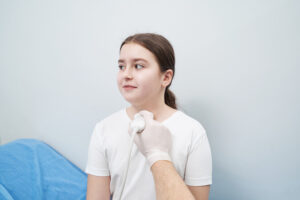Autoimmune diseases can affect people of all ages. The same is true for autoimmune thyroid diseases (AITDs) such as Hashimoto’s disease. In fact, many people are living with Hashimoto’s disease - even children!
It is estimated that between 1-2% of children live with the condition. It can even manifest in toddlers.
At the end of the day, it’s important to understand this AITD and how it affects the lives of our kids. Keep reading to learn what Hashimoto’s disease is and how to treat it.
What is Hashimoto’s Disease?
First, let’s discuss what Hashimoto’s disease is.
Hashimoto's disease is an autoimmune condition that affects the thyroid gland. It is also referred to as chronic lymphocytic thyroiditis. In this condition, the immune system may attack and destroy thyroid tissue. This leads to symptoms such as:
- Excessive fatigue
- Poor growth
- Weight gain
- Constipation
- Goiter
- Muscle aches
It is unclear what causes Hashimoto’s disease. However, some experts suggest that genetics can play a role in the condition, along with environmental exposures.

Hashimoto’s Disease vs Hypothyroidism
Hypothyroidism is defined as having low thyroid hormone levels or underactive thyroid. Oftentimes, hypothyroidism is a result of Hashimoto’s disease - as in it’s a common consequence.
However, it is important to note that Hashimoto's disease is not the same as hypothyroidism. You can have Hashimoto’s disease but not have hypothyroidism. Alternatively, you can have hypothyroidism and not have Hashimoto’s disease. You can also have antibodies against the thyroid gland but not have inflammation of the gland.
If you are unsure if your child is living with Hashimoto’s disease or hypothyroidism - or both - it’s best to seek medical advice from a pediatric endocrinologist.
Phases of Hashimoto’s Disease
Living with Hashimoto’s disease can occur in 3 distinct phases. Not everyone will experience each phase, but it is important to recognize all 3 of them:
- Dormant phase: you can have detection of antibodies against the thyroid gland and the thyroid gland continues to function the way it should
- Destructive phase (Hashitoxicosis): an individual can experience transient hyperthyroidism when the thyroid cells release thyroid hormone in an unregulated manner. Hyperthyroidism happens when more thyroid hormones are released than needed. Not everyone will experience this.
- Hypothyroid phase: Once enough tissue has been destroyed, hypothyroidism will occur. At this point, thyroid hormone replacement is needed.
As mentioned above, it’s important to know that not everyone’s body reacts the same to this disease. In fact, many medical professionals recognize the rule of thirds:
- 1/3rd of those with positive antibodies will never need thyroid hormone replacement
- 1/3rd will develop hypothyroidism
- 1/3rd will experience hashitoxicosis
Now, let’s talk about how to diagnose the disease.
How to Diagnose and Evaluate Hashimoto’s Disease
If you suspect your child is suffering from this AITD, a pediatric endocrinologist can evaluate the condition through blood work.
Most likely, blood work will detect positive antibodies for the disease. However, this is not always the case.
Depending on the rule of thirds, abnormal thyroid hormone values may be detected. If an ultrasound is obtained, the thyroid gland may be enlarged, which will show increased blood flow and appear to have pseudonodules giving the gland a giraffe-like pattern.
Overtime, if the gland gets destroyed, it will appear atrophic, or small with decreased blood flow. Take note that an ultrasound is not required to make the diagnosis nor needed for routine management.
Is There a Dietary Treatment for Hashimoto’s Disease?
Are there placebo controlled dietary intervention studies in people who have hashimoto’s disease? Unfortunately no, these studies do not exist. The answer is not straight-forward.
However, there is much more evidence that an inflammatory diet increases the risk for cardiac disease, cancer, Alzheimer's disease, and other diseases. So, if the symptoms do not improve with thyroid medication, you may want to consider diet and food choices.
First, you can incorporate more fresh fruits and vegetables in your child’s diet. Next, reduce or eliminate processed foods such as refined carbohydrates and processed meats like bacon and hotdogs.
Keep in mind that taking on a very restrictive diet may put your child at risk for nutritional deficiencies. It’s always a good idea to talk to your pediatrician before you radically change your child’s diet.
How to Treat Hashimoto’s disease
Once the diagnosis is made by your pediatric endocrinologist, the hypothyroidism can be treated with thyroid hormone replacement. Symptoms will typically improve with treatment.

If they do not, there may be other options for treatment or a further evaluation for other associated conditions may be required. Additionally, your child will need lifelong monitoring of their thyroid levels to stay healthy.
Concerned Your Child is Living with Hashimoto’s Disease?
Although not uncommon, living with Hashimoto’s disease is a reality for some children.
If you are concerned about your child’s health or have questions about this disease and its effects on children, a pediatric endocrinologist, like Dr. McIver, can help.

